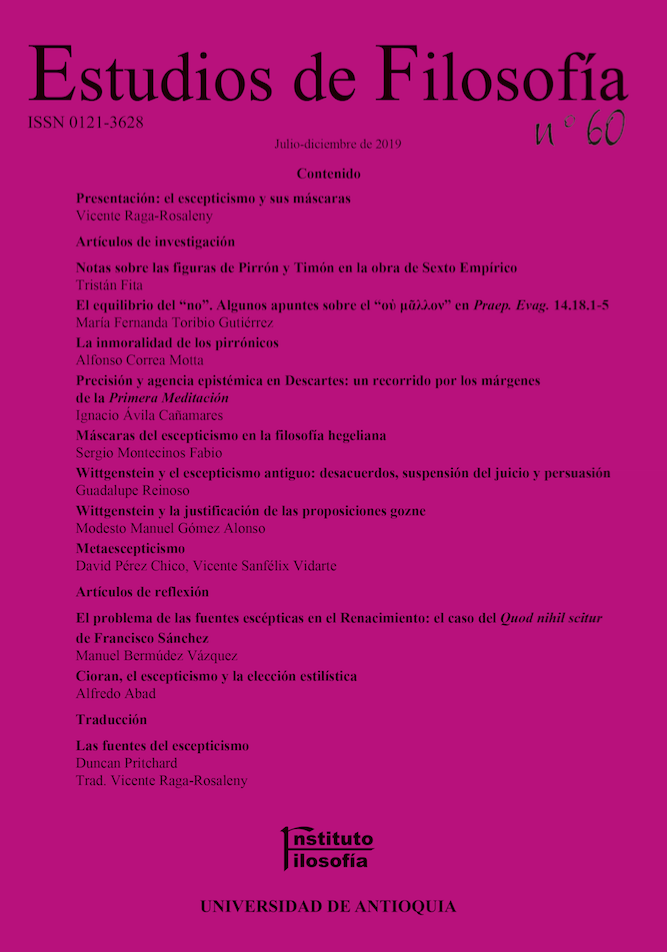The issue of the skeptical sources in the Renaissance: the case of Sanchez’s Quod nihil scitur
DOI:
https://doi.org/10.17533/10.17533/udea.ef.n60a10Keywords:
philosophy, skepticism, Renaissance, Francisco SánchezAbstract
Among the problems that contemporary research has had to deal with when analyzing the recovery of skepticism in the Renaissance, there is not only the question of the sources, but also the type of skepticism that these sources transmitted. In these pages we propose to revisit the question of the sources that influenced the writing of one of the fundamental works of Renaissance skepticism, Francisco Sanchez’s book That nothing is known.
Downloads
References
Bayle, P. (1702). Dictionnaire Histórique et Critique. Rotterdam: Editorial Reiner Leers.
Bermúdez Vázquez, M. (2006). La recuperación del escepticismo en el Renacimiento como propedéutica de la filosofía de Francisco Sánchez. Madrid: Editorial Fundación Universitaria Española.
Bermúdez Vázquez, M. (2007). Michel de Montaigne: La culminación del escepticismo en el Renacimiento. Córdoba. Editorial Servicio de Publicaciones de la Universidad de Córdoba
Bermúdez Vázquez, M. (2014). La fuerza de la duda: Francisco Sánchez el escéptico. Madrid: Editorial Dionysianum.
Bermúdez Vázquez, M. (2016). “Pedro de Valencia”, en http://www.uco.es/philosophical-skepticism/philosophical-skepticism/reception-and-survival/pedro-valencia.html
Bruno, G. (1968). Giordano Bruno e Tomasso Campanella. Scritti scelti, edición de L. Firpo. Turín: Editorial Utet.
Carvalho, J. de (1981). Obra completa. I/2, Filosofia e historia da filosofía. Lisboa: Fundaçao Calouste Gulbenkian.
Comparot, A. (1984). Il n’est science de rien, edición crítica latín-francés. Paris: Klincksieck.
Cusa, N. de. (1966). La docta ignorancia, traducción de Manuel Fuentes Benot. Buenos Aires: Aguilar.
Diógenes Laercio. (2007). Vidas de filósofos ilustres. Madrid: Editorial Alianza.
Limbrick, E. (1988). That nothing is known (Quod nihil scitur). Introducción, nota y bibliografía de Elaine Limbrick. Cambridge: Cambridge University Press.
Montaigne, M. de (2006). Ensayos. Barcelona: Editorial Acantilado.
Paganini, G. (1991). Scepsi moderna. Interpretazioni dello scetticismo da Charron a Hume. Consenza: Editorial Busento.
Popkin, R. (2003). The History of Scepticism from Savonarola to Bayle. Nueva York: Editorial Oxford University Press.
Preti, G. (1974). “Lo scetticismo e il problema de la conoscenza”, Rivista critica di storia della filosofía, 29(2), 123-143.
Rodríguez Peregrina, J. M. (1995). “La retórica clásica en el De disciplinis de Luis Vives”. En Florentia Iliberritana. Revista de estudios de Antigüedad Clásica, 6, 417-431.
Román, R. (1994). El escepticismo antiguo: posibilidad del conocimiento y búsqueda de la felicidad. Córdoba: Editorial Servicios de Publicaciones de la Universidad de Córdoba.
Sánchez, F. (1984). Quod nihil scitur. Edición y traducción de Sergio Rábade, J. M. Artola y M. F. Perez. Madrid: Consejo Superior de Investigaciones Científicas.
Sánchez, F. (1988). That nothing is known (Quod nihil scitur). Introducción, nota y bibliografía de Elaine Limbrick. Cambridge: Cambridge University Press.
Schmitt, Ch. B. (1972). Cicero scepticus. La Haya: Editorial M. Nijhoff.
Senchet, E. (1904). Essai sur la méthode de Francisco Sanchez. París: Editorial V. Giard & E. Briére.
Villey, P. (1968). Les sources et l’évolution des Essais de Montaigne, Nueva York: Burt Franklin.
Published
How to Cite
Issue
Section
Categories
License
Copyright (c) 2019 Manuel Bermúdez Vázquez

This work is licensed under a Creative Commons Attribution-NonCommercial-ShareAlike 4.0 International License.
Authors who publish with this journal agree to the following terms:
1. The Author retains copyright in the Work, where the term "Work" shall include all digital objects that may result in subsequent electronic publication or distribution.
2. Upon acceptance of the Work, the author shall grant to the Publisher the right of first publication of the Work.
3. The Author shall grant to the Publisher a nonexclusive perpetual right and license to publish, archive, and make accessible the Work in whole or in part in all forms of media now or hereafter known under a Creative Commons Attribution-NoCommercia-ShareAlike (CC BY-NC-SA 4.0), or its equivalent, which, for the avoidance of doubt, allows others to copy, distribute, and transmit the Work under the following conditions: (a) Attribution: Other users must attribute the Work in the manner specified by the author as indicated on the journal Web site;(b) Noncommercial: Other users (including Publisher) may not use this Work for commercial purposes;
4. The Author is able to enter into separate, additional contractual arrangements for the nonexclusive distribution of the journal's published version of the Work (e.g., post it to an institutional repository or publish it in a book), as long as there is provided in the document an acknowledgement of its initial publication in this journal;
5. Authors are permitted, and Estudios de Filosofía promotes, to post online the preprint manuscript of the Work in institutional repositories or on their Websites prior to and during the submission process, as it can lead to productive exchanges, as well as earlier and greater citation of published work (see The Effect of Open Access). Any such posting made before acceptance and publication of the Work is expected be updated upon publication to include a reference to the Estudios de Filosofía's assigned URL to the Article and its final published version in Estudios de Filosofía.















